Drug and Alcohol Abuse Statistics in Lynchburg, VA
During the first 8 months of 2022, there were 107 overdoses in Lynchburg.4
The rate of drug-related crime in Lynchburg is 1.67 per 1,000 residents per year.
In 2021, Campbell County officers made 57 DUI arrests.6
42% of Lynchburg area survey respondents reported binge drinking in the past 30 days.7
Levels of Substance Abuse Treatment
Many Virginians work their way through the following continuum of care levels. Others may begin treatment at one of the least restrictive levels.
Detox
Detox is often the initial step of treatment, which must be completed before you can transition to a formal SUD program. It is the process of safely and comfortably clearing your body of all drugs and alcohol. This occurs in a supervised setting such as a hospital or inpatient facility.
Residential or Inpatient
This is the most intensive treatment setting, involving 24/7 care. During residential treatment, you live at a rehab facility and participate in several forms of therapy, including individual and group therapy, medications, and recreational therapy.
Partial hospitalization programs (PHPs)
PHPs involve many of the same treatment methods used in inpatient care. However, you do not live at the facility. You return home during non-treatment times.
Intensive Outpatient Programs (IOPs)
This is a step down from PHPs. IOPs involve attending several hours of treatment throughout the week, which usually includes individual and group therapy.
Standard Outpatient
This is the least restrictive level of treatment. Standard outpatient programs involve a couple of hours of care per week. Virginians with a high level of motivation and a good support network typically experience success with this type of treatment.
Aftercare
Once inpatient or outpatient treatment is completed, aftercare provides continued support to prevent relapse. This may include 12-step meetings, transitional housing, or therapy.
How to Pay for Drug Rehab in Lynchburg, Virginia
Private Insurance
The Mental Health Parity and Addiction Equity Act requires all insurance providers to cover substance abuse treatment to some extent. Because each plan differs regarding specific coverage, it is important for Virginia residents to confirm what their particular plan includes.
Virginia Medicaid
Virginia Medicaid is a government program that provides health insurance for low-income Virginia residents. To receive Medicaid, residents must meet income requirements and apply for the coverage.
Virginia Medicare
Medicare is a federally funded health insurance program for Americans aged 65 and over and certain individuals with disabilities. To participate in the program, Virginians must meet requirements and pay a monthly premium based on income. Benefits may include coverage for substance abuse treatment, if the rehab facility chosen accepts Medicare as a form of payment.
TRICARE in Virginia
TRICARE in Virginia (East region) is a nationwide program that provides health insurance coverage for U.S. military personnel, veterans, and their dependents. Benefits include some coverage for addiction treatment services.
Sliding Scale Rehabs
Sliding scale rehabs charge Virginians only what they can afford to pay for treatment, based on their income. Residents must provide proof of income to qualify.
IHS-Funded Drug Rehabs
Indian Health Service (IHS) rehabs provide free or low-cost treatment for Native Americans and Native Alaskans who need SUD treatment.
Traveling to and Within Lynchburg, VA

If you will be traveling for alcohol and drug rehab in Lynchburg, VA or visiting a loved one currently undergoing treatment at a Lynchburg drug and alcohol rehab, here are some valuable tips to guide your travel plans:
- While Lynchburg Regional Airport is only 11 miles away, for better flight options, consider Roanoke Regional Airport (59 miles), Richmond (100 miles), or Raleigh/Durham (109 miles).
- The Greater Lynchburg Transit Company offers bus service on 14 routes, operating M-F 5am-10:15pm, and 10 routes on Saturdays 6am-10:15pm. Fares are $2 ($1 for seniors and ADA qualified).
- Lynchburg is not considered walkable or bikeable, but rideshare services such as Lyft and Uber are available to get around the city by car.
- Lynchburg offers multiple hotel, motel, and vacation rental options for overnight accommodations. Locals generally consider the northwest part of the city to be the safest.
- Popular attractions in Lynchburg include Thomas Jefferson’s Poplar Forest, Anne Spencer House & Public Garden, and the Academy Center of the Arts.
- Great day trip options from Lynchburg include Natural Bridge & Luray Caverns, Colonial Williamsburg, Smith Mountain Lake, and Raleigh, NC.
Virginia Drug and Alcohol Laws
In Virginia, lawmakers have enacted the following policies to govern substance use, overdoses, and addiction treatment.1,2,3,4
Good Samaritan Law: In 2015, Virginia passed its Good Samaritan Law. This offers protection for individuals who use illicit substances and experience or witness an overdose. It encourages Virginia residents to call 911 without fear of legal repercussions for minor drug-related charges.
Employee Protections for Addiction Treatment: In Virginia, substance use disorders are considered a disability, per the Americans with Disabilities Act. This means employees are protected from discrimination for having a substance use disorder. However, this law does not prevent employers from taking disciplinary action against employees who use substances during work hours.
First-time Offender Program: First-time drug offenders in Virginia can use this program to avoid jail time. Virginia residents who are charged with possession can have charges deferred while they complete a program. Conditions may include community service, substance abuse education, substance abuse treatment, and random drug tests. Successful completion of all conditions can result in a dismissal of the drug charges.
Drug Trafficking: Virginia’s laws regarding drug trafficking are stringent. In this state, it is a felony to transport, sell, or import even small amounts of controlled substances. This includes one or more ounces of Schedule I or Schedule II controlled substances such as cocaine, meth, morphine, PCP, and Ritalin, as well as five or more pounds of marijuana.
Resources
- S. County Opioid Dispensing Rates, 2020. (2022, October 7). CDC Injury Center. https://www.cdc.gov/nchs/nvss/vsrr/prov-county-drug-overdose.htm
- Harfmann, T. (2021, September 21). Lynchburg sees a drop in substance abuse among high school students. WSLS 10. https://www.wsls.com/news/local/2021/09/21/lynchburg-sees-a-drop-in-substance-abuse-among-high-school-students/
- Childress, K. (2021, November 18). Deadliest year for drug overdoses; new CDC data shows alarming numbers. WSET. https://wset.com/news/addicted-america/deadliest-year-for-drug-overdoses-new-cdc-data-shows-alarming-numbers
- Harfmann, T. (2022, September 1). New Lynchburg police report shows a local drug overdose increase. WSLS 10. https://www.wsls.com/news/local/2022/09/01/new-lynchburg-police-report-shows-a-local-drug-overdose-increase/
- Lynchburg, VA drug-related crime rates and maps. (n.d.). CrimeGrade.Org. Retrieved December 27, 2022, from https://crimegrade.org/drug-crimes-lynchburg-va/
- Campbell County Sheriff’s Office. (2021). Annual Report. http://www.campbellcountyva.gov/DocumentCenter/View/8349/2021-Annual-Report
- (n.d.). 2018- 2021 Lynchburg Area Community Health Needs Assessment. https://www.communityaccessnetwork.org/wp-content/uploads/2019/01/2018_lynchburg_chna_final-1.pdf
- Lowndes, R. (2022, July 30). WFXRtv. WFXRtv. https://www.wfxrtv.com/news/local-news/lynchburg-central-virginia-news/opioid-more-deadly-than-fentanyl-found-in-campbell-co/



